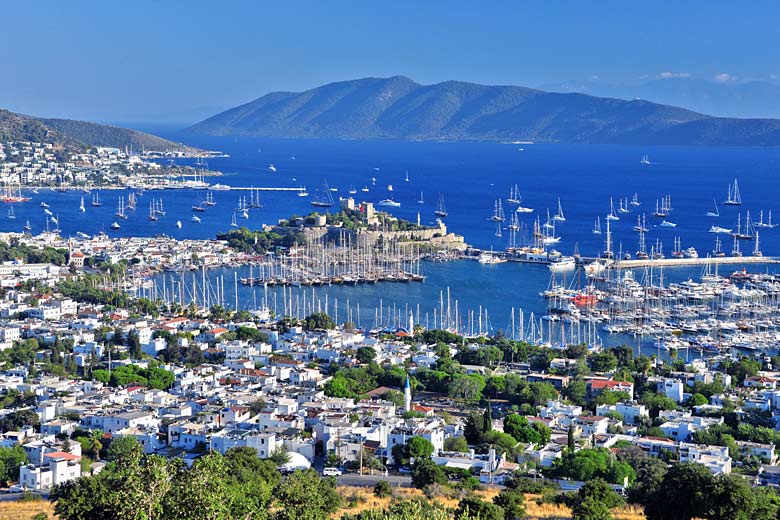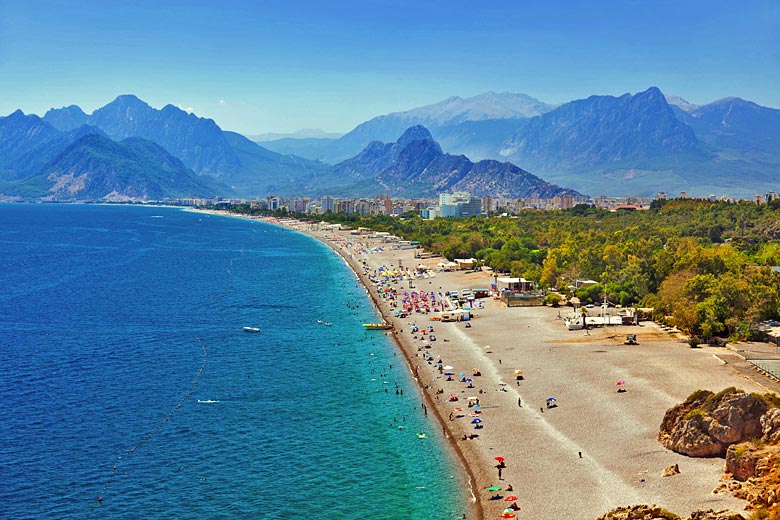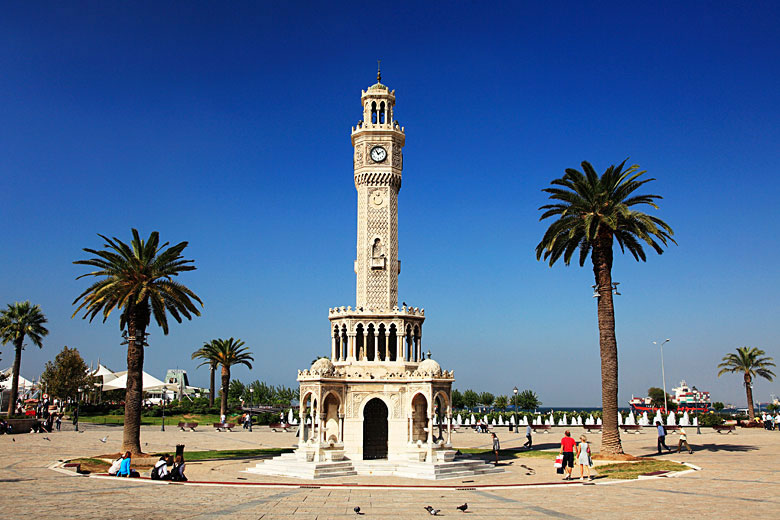- Explore latest special offers & online deals from TUI
- Free child places & £0 deposits with direct debit available
- Book summer & winter sun holidays in 2026/2027
Best time to visit Turkey
The best times to visit Turkey (Istanbul) are in June, July, August and September based on our default weather conditions. Update your weather preferences to see which months best match.
Turkey by month
Jan Feb Mar Apr May Jun Jul Aug Sep Oct Nov Dec
Recommended for Turkey
Top Turkey destinations
Below are the temperatures expected today at popular countries, regions and places in Turkey. Select a destination to compare today's forecast with average weather conditions.
- Alanya
- Antalya Coast
- Belek
- Bodrum & Izmir Coast
- Dalaman & Marmaris Coast
- Dalyan
- Gumbet
- Lara Beach
- Olu Deniz
- Kalkan
- Ovacik
- Istanbul
All Turkey regions
All Turkey destinations
- Adana
- Akyaka, Bodrum & Izmir
- Akyarlar, Bodrum & Izmir
- Alanya, Antalya Coast
- Altinkum, Bodrum & Izmir
- Amasra
- Ankara
- Antalya, Antalya Coast
- Ayder
- Aydin, Bodrum & Izmir
- Beldibi, Antalya Coast
- Belek, Antalya Coast
- Bitez, Bodrum & Izmir
- Bodrum, Bodrum & Izmir
- Bursa
- Calis Beach, Dalaman & Marmaris
- Camyuva, Antalya Coast
- Canakkale
- Cesme, Bodrum & Izmir
- Colakli, Antalya Coast
- Dalaman, Dalaman & Marmaris
- Dalyan, Dalaman & Marmaris
- Datca, Dalaman & Marmaris
- Denizyaka, Antalya Coast
- Derekoy, Bodrum & Izmir
- Diyarbakir
- Dogubayazit
- Erzurum
- Fethiye, Dalaman & Marmaris
- Finike, Antalya Coast
- Gocek, Dalaman & Marmaris
- Gokcebel, Bodrum & Izmir
- Gokova, Bodrum & Izmir
- Goreme
- Gulluk, Bodrum & Izmir
- Gumbet, Bodrum & Izmir
- Gumusluk, Bodrum & Izmir
- Gundogan, Bodrum & Izmir
- Hisaronu, Dalaman & Marmaris
- Icmeler, Dalaman & Marmaris
- Incekum, Antalya Coast
- Istanbul
- Izmir, Bodrum & Izmir
- Kadikalesi, Bodrum & Izmir
- Kahta
- Kalkan, Dalaman & Marmaris
- Kars
- Kas, Dalaman & Marmaris
- Kayseri
- Kemer, Antalya Coast
- Kiris, Antalya Coast
- Konacik, Bodrum & Izmir
- Konakli, Antalya Coast
- Konya
- Kumkoy, Antalya Coast
- Kusadasi, Bodrum & Izmir
- Lara Beach, Antalya Coast
- Manavgat, Antalya Coast
- Marmaris, Dalaman & Marmaris
- Mazi, Bodrum & Izmir
- Mugla, Bodrum & Izmir
- Nevsehir
- Olu Deniz, Dalaman & Marmaris
- Ortakent, Bodrum & Izmir
- Ovacik, Dalaman & Marmaris
- Ozdere, Bodrum & Izmir
- Pamukkale
- Rize
- Samsun
- Sanliurfa
- Sarigerme, Dalaman & Marmaris
- Side, Antalya Coast
- Sinop
- Sivas
- Tekirova, Antalya Coast
- Torba, Bodrum & Izmir
- Trabzon
- Turgutreis, Bodrum & Izmir
- Turkbuku, Bodrum & Izmir
- Turunc, Dalaman & Marmaris
- Urgup
- Uzumlu, Dalaman & Marmaris
- Van
- Yaliciflik, Bodrum & Izmir
- Yalikavak, Bodrum & Izmir
- Yusufeli
When is the best time to visit Turkey?
Max Day Temperature (°C)
- Jan
 8
8 - Feb
 9
9 - Mar
 11
11 - Apr
 16
16 - May
 21
21 - Jun
 25
25 - Jul
 27
27 - Aug
 27
27 - Sep
 24
24 - Oct
 19
19 - Nov
 15
15 - Dec
 11
11
Best time to visit
The weather guide for Turkey (Istanbul) shows long term weather averages processed from data supplied by CRU (University of East Anglia) & today's weather forecast provided by meteoblue. Find out more about our data sources.
Metric (°C / mm) | Imperial (°F / inches)
Turkey weather overview
Part of Turkey is in Europe but the bulk of it, Anatolia, lies in Asia. Anatolia is a high plateau with mountains to its east, north and south. The higher peaks draw snow throughout the year and the climate here contrasts with that of lower ground and coastal regions to give Turkey a wide variety of weather conditions.
The country's interior has a hot, arid summer climate and cold winters which increase in harshness the further east you go. The coasts bordering the Black Sea, the Aegean and the Mediterranean Coast have higher rainfall and warmer winters. Even between the coasts, however, conditions can vary.
The area surrounding Istanbul and the Black Sea is slightly colder in winter and rainier throughout the year than the shorelines to the west and south whose weather is more typically Mediterranean and can be hot and sticky on summer nights.
The hottest part of Turkey is the wide plain which borders Syria at the entrance to the Taurus Mountains. Here, you'll find a desert-like climate with fiercely hot summers and cold winters.
What to pack for Turkey weather
Light clothes are fine in the summer months, but in winter take very warm clothes for visiting the interior or the mountains.
More about Turkey
Explore our complete guide to Turkey with the latest travel advice for travellers and holidaymakers including official updates and local travel tips for Turkey.
- Essential information
- Ready to book?
- Top travel deals
- Travel advice
- Travel health
- Travel features
- FAQs

Turkey essential information
Below is a beginner's guide to Turkey with essential travel facts such as dominant language spoken, typical flight time from the UK and the local currency. You can also check whether visas are required and what plug adapter you need to pack.
| Turkey - quick facts | |
|---|---|
| Flight time✝ | 4 to 6.5 hours |
| Time difference | UK +3 hours |
| Language(s) | Turkish, Kurdish |
| Currency | Turkish Lira |
| Electricity | C + F plug (230V) |
| Driving side | Right |
✝ = Typical flight time from the UK.
Travelling to Turkey?
Discover where to book holidays, flights, hotels and more from popular travel providers for your trip to Turkey in 2026/2027.
- Airport taxis
- Boat rental
- Buses & trains
- Car hire
- Driving advice
- eSIMs
- Ferries
- Money transfers
- Ocean cruises
- Things to do
- Tours
Holidays to Turkey
 |
TUI Find and book ATOL protected holidays to Turkey and destinations worldwide with low deposits and free child places available. |
 |
Club Med Luxury all-inclusive holiday group offering sun holidays, ski holidays and cruises to over 40 countries including Turkey. |
 |
Jet2holidays UK's largest package holiday provider offers escapes to Turkey. Book holidays to Europe and North Africa from regional UK airports. |
 |
Just Go Holidays One of the UK's leading coach holiday operators, offering great-value trips across the UK, Ireland and Europe. |
 |
Love Holidays Book holiday packages to worldwide destinations with this UK-based OTA. Pay low deposits and get best price promise. |
 |
easyJet holidays Popular, low-cost holiday provider covering over 100 destinations across Europe and North Africa including Turkey. |
 |
Broadway Travel With 75 years+ history, this UK independent travel agency offers great-value holidays, hotels and cruises to Turkey and beyond. |
 |
First Choice Part of the TUI Group, this well-known UK travel brand offers package holidays to Turkey and beyond. |
 |
Hays Travel UK's largest independent travel agency offers no and low-deposit getaways to countless destinations worldwide including Turkey. |
 |
Mercury Holidays Award-winning travel provider offering package holidays, escorted tours and river cruises to Turkey and more. |
 |
National Holidays UK-based travel company specialising in affordable coach holidays and short breaks around the UK, Ireland and Europe. |
 |
On the Beach One of the UK's largest OTAs specialising in affordable package beach holidays to Turkey and beyond. |
 |
Secret Escapes Members-only travel club offering exclusive deals on hand-picked luxury hotels and holidays to Turkey and more. |
 |
Sunshine.co.uk UK OTA offering low-cost holidays, hotels and flights to Turkey and beyond. Low deposit deals available. |
 |
Thomas Cook This iconic British travel brand invented the package holiday. Now offers holidays, city breaks and hotels to Turkey and more. |
 |
Travelbag Award-winning UK-based travel company specialising in personalised long-haul holidays to Turkey and further afield. |
 |
Expedia Compare and book holidays, flights, hotels, car hire and more on this trusted website covering global destinations. |
 |
Holiday Discount Centre Compare millions of cheap holiday deals to Turkey and beyond on this popular UK travel comparison website. |
 |
Holiday Hypermarket Specalists in discounted beach, ski and city holiday packages, this UK-based OTA is part of TUI. |
 |
lastminute.com Leading European travel company specialising in dynamic holiday packages to thousands of destinations including Turkey. |
 |
TUI Ireland One of Ireland's largest tour operators, offering flights, cruises and package holidays from Irish airports to Turkey and beyond. |
Tours to Turkey
 |
Travelsphere UK-based tour operator with 60+ years experience. Offers award-winning guided tour holidays across six continents. |
 |
Wendy Wu Tours UK's leading specialist tour operator to China, Japan and southeast Asia. Flights, hotels, meals, guides and visa included. |
 |
Explore! Adventure travel company offering authentic experiences for small groups to over 100 countries including Turkey. |
 |
Riviera Travel The UK's leading river cruise and tour operator, offering scenic experiences worldwide including in Turkey. |
 |
Newmarket Holidays Long-established travel brand offering escorted tours, river cruises, resort stays and more to Turkey and beyond. |
 |
Just You Specialists in solo travel for over 25 years. Offers a range of trips and experiences to worldwide destinations including Turkey. |
 |
Exoticca Online tour operator offering cultural trips and experiences designed by an in-house team of travel experts. |
 |
G Adventures Award-winning adventure travel brand specialising in small-group tours, safaris and expeditions across all seven continents. |
 |
Saga Holidays Award-winning travel operator specialising in escorted tours and hotel holidays to Europe and worldwide for over 50s. |
 |
Topdeck Global tour operator specialising in small group tours for 18-30 somethings to Europe, Asia, New Zealand and North Africa. |
 |
Trafalgar Discover your next guided tour through this top-rated travel brand covering every destination from Europe to Australia. |
 |
TUI Tours Browse from a wide range of tour packages with expert local guides through TUI's dedicated escorted tour brand. |
 |
Contiki Global travel brand for 18-35s, offering over 200 all-inclusive group trips across six continents. Low deposit bookings available. |
Flights to Turkey
 |
TUI One of the world's leading tourism brands. Offers flights, hotels and cruises to Turkey and beyond. |
 |
British Airways The UK's national flag carrier is a major global airline, serving over 200 destinations across 80 countries including Turkey. |
 |
Turkish Airlines Fly to more than 120 countries including Turkey and book hotels, car hire and travel insurance with Turkey's national airline. |
 |
Air France This major French international airline serves almost 170 destinations across 73 countries including Turkey via its hub in Paris. |
 |
Jet2 Major British low-cost airline serving over 70 sun, city and ski destinations across Europe including Turkey. |
 |
KLM The Netherland's national flag carrier and the world's largest airline. Serves 170 international destinations via Amsterdam. |
 |
Qatar Airways Qatar's state-owned flag carrier flies to over 170 destinations worldwide across 80+ countries including Turkey. |
 |
eDreams Leading European OTA offering thousands of flights and hotels across 40,000 destinations including Turkey. |
 |
KAYAK Search and compare flights, hotels, car hire and package holidays through this award-winning travel search engine. |
 |
Kiwi.com Global OTA and search engine specialising in affordable flights, hotels and car hire across worldwide destinations including Turkey. |
Hotels in Turkey
 |
Hilton Leading global hospitality brand with a portfolio of 9,000 properties across 141 countries and territories including Turkey. |
 |
Radisson Hotels Major international hotel group with 10 brands and over 1,520 hotels worldwide including in Turkey. |
 |
IHG Leading global hotel group with a portfolio of international brands including Holiday Inn, Crowne Plaza and more. |
 |
Barcelo Spanish hotel chain with 90+ years of experience. Accommodation locations include Spain, Mexico and the UAE. |
 |
Marriott The world's largest hotel company with a portfolio of 30+ brands and almost 9,600 properties across 143 countries. |
 |
ALL World-leading hospitality group offering experiences and stays across more than 110 countries including Turkey. |
 |
Millennium Hotels Singapore-based global hotel group operating across Asia, Europe, USA, New Zealand and the Middle East. |
 |
Agoda One of the world's largest online travel platforms with a network of over 6 million hotels. Plus flights, activities and more. |
 |
Booking.com Leading global OTA founded in Amsterdam. Offers worldwide accommodation, flights, car hire, activities and more. |
 |
Hotels.com Part of Expedia Group, this major OTA offers deals and discounts on hotel rooms worldwide including in Turkey. |
 |
Priceline Leading OTA for discounted flights, hotels, cruises, car hire, experiences and packages worldwide including in Turkey. |
 |
Trivago Global travel brand and metasearch engine that compares accommodation prices across different online booking sites. |
Accommodation in Turkey
 |
Simpson Travel Family-run tour operator with an award-winning collection of handpicked properties across Europe including Turkey. |
 |
Solmar Villas Award-winning family-run holiday operator with over 2,500 villas across 40+ destinations including Turkey. |
 |
SPL Villas Travel enthusiasts and villa holiday experts with over 50 years of experience. Destinations include Cyprus, Greece and Italy. |
 |
Vintage Travel Independent villa holiday company specialising in private homes across Europe including Turkey and beyond. |
 |
Hostelworld Leading global OTA for hostels and budget accommodation worldwide. Perfect for travellers looking to connect. |
 |
VRBO Owned by Expedia Group, this online holiday marketplace offers a unique selection of 2+ million homes worldwide. |
Ocean cruises to Turkey
 |
Marella Cruises This British cruise line is operated by TUI UK and sails to destinations across the Mediterranean, Atlantic and Caribbean. |
 |
Fred Olsen Set sail from the UK to worldwide destinations including Turkey with this long-standing cruise company. |
Things to do in Turkey
 |
Viator The world's largest online marketplace for tours, activities and attractions. Owned by Tripadvisor. |
 |
Get Your Guide Major global marketplace specialising in travel experiences. Covers tours and attractions across six continents. |
 |
Isango Browse and book great-value sightseeing tours, experiences and attractions across 300+ destinations including Turkey. |
 |
Klook Find and book thousands of experiences via this online travel platform covering worldwide destinations including Turkey. |
 |
Tiqets Online marketplace for tours, activities and attractions. Partners with over 2500 venues across 60+ countries including Turkey. |
Buses & trains in Turkey
 |
Flixbus International bus and train operator operating great-value, long-distance services across 40+ countries across Turkey. |
Car hire in Turkey
 |
Goldcar Low-cost car rental company with 30+ years of experience. Started in Alicante, Spain then expanded across 100+ destinations. |
 |
Avis Award-winning global car rental provider with over 5,500 locations across 170 countries including Turkey. |
 |
Enjoy Travel Compare and book car hire, hotels, airport parking, attractions and more on this trusted global travel platform. |
 |
Europcar Global car and van hire provider with over 3,800 locations in over 140 countries worldwide including Turkey. |
 |
Sixt Trusted international car rental company offering mobility services across 2,200+ locations in 105 countries including Turkey. |
 |
Carrentals.co.uk Car rental price comparison website. Offers 24,000+ pick-up locations and free cancellation. |
 |
Holiday Autos Browse and book car hire worldwide with Holiday Autos. Serves over 50,000 locations worldwide including Turkey. |
 |
KAYAK Leading global travel search engine for finding and comparing flights, hotels, car hire and more. |
 |
Zest Car Rental Formerly Economy Car Hire, this leading UK car hire broker covers over 1,500 destinations worldwide. |
Ferries in Turkey
 |
Direct Ferries Compare and book 1000s of scheduled ferry services around Europe and Africa through this impartial multi platform. |
Money transfers to Turkey
 |
Wise.com Formerly TransferWise, this British fintech company offers low-cost money transfers, multi-currency accounts and more. |
 |
World Remit International money transfer service allowing customers to send money securely to over 130 countries including Turkey. |
 |
XE Money Transfers Global fintech company offering reliable money transfers across 190+ countries in over 130+ currencies. |
Airport taxis for Turkey
 |
Hoppa Search, compare and book taxis, shuttles, trains and more from 1,000s of providers worldwide including in Turkey. |
 |
Shuttle Direct Taxi, bus and shuttle service offering great-value airport transfers to worldwide destinations including Turkey and more. |
Boat rental for Turkey
 |
SamBoat Global boat hire platform connecting boat owners and renters around the world including in Turkey. |
Driving advice for Turkey
 |
RAC European breakdown cover and roadside assistance policy offering both single trip and annual cover and 24/7 support. |
eSIMs for Turkey
 |
Amigo Trusted eSIM provider for international travel in over 194 destinations. Easy to install with no roaming fees. |
 |
Airalo The world's first eSIM store, offering affordable eSIMs for 200+ countries around the world including Turkey. |
 |
Holafly International eSIM provider offering unlimited data, zero roaming charges and easy installation. |
 |
Roamless Global eSIM provider operating in over 200 countries including Turkey. Pay-as-you-go and data plans available. |
Turkey travel deals
Check out the latest deals, discount codes and special offers on holidays, flights, hotels and more for Turkey in 2026/2027. Pay low deposits and save with last minute holidays, early bird offers and free kids places where available.
- Explore latest special offers & online deals from TUI
- Free child places & £0 deposits with direct debit available
- Book summer & winter sun holidays in 2026/2027
- Book 2026 holidays & get free perks with On the Beach
- Perks vary based on hotel star rating & promotional T&Cs
- Free lounge access, gadget cover, weather protection & more
Expires at 23:59 on Monday 31st Aug 2026 · View all On the Beach offers
- Save up to £500 on easyJet holidays in 2026/2027
- Discount varies by minimum spend. T&Cs apply
- Travel before 31st October 2027 (inclusive)
 ******ALE
******ALE
Expires at 23:00 on Tuesday 3rd Mar 2026 · View all easyJet holidays offers
- Save up to £550 on selected holidays in 2026/2027
- Book discounted holidays with 'Sale' label
- Discounts varies by destination & holiday type. T&Cs apply
Expires at 23:59 on Sunday 8th Mar 2026 · View all Love Holidays offers
- Save 15% on ALL tours in 2026, 2027 & 2028
- Filter tour deals by destination, price & more
- Travel before 31st December 2028 (inclusive)
Expires at 23:59 on Friday 13th Mar 2026 · View all Newmarket Holidays offers
- Save up to £500 on holidays with Hays Travel
- Plus low deposits with interest-free monthly payments
- Free child places on family holidays
- Save up to 50% on 2026 holidays & tours with Travelbag
- Book selected stays in popular destinations around the world
- Travel before 31st December 2026 (inclusive)
Expires at 23:59 on Saturday 28th Feb 2026 · View all Travelbag offers
- Save up to £800 per couple on selected worldwide tours
- Plus save up to £300 per couple on European tours
- Book tours online in Travelsphere New Year sale
Expires at 23:59 on Saturday 28th Feb 2026 · View all Travelsphere offers
- Save 25% on Jet2.com flights travelling before 30 June 2026
- Plus 20% on other Jet2.com flights in 2026/2027
- Travel before 31st October 2027 (inclusive)
Expires at 23:59 on Saturday 28th Feb 2026 · View all Jet2 offers
- Save up to £300 on summer holidays with First Choice
- Plus EXTRA £200 discount on selected stays
- Travel between 1st May & 31st Oct 2026 (inclusive)
Expires at 23:59 on Monday 2nd Mar 2026 · View all First Choice offers
- Explore expert-led tours, events & experiences at low prices
- Book tickets & things to do in popular cities worldwide
- Browse deals by city & theme or search by activities
Turkey travel advice
Check the latest travel advice and guidance on visiting Turkey from official government sources (in english) from around the world including entry requirements and travel restrictions.
- UK traveller advice for Turkey - UK FCDO
- Irish traveller advice for Turkey - Department of Foreign Affairs, Ireland
- Canadian travel advice for Turkey - Government of Canada
- US travel advisories for Turkey - US Department of State
- Safe travel advisories for Turkey - Ministry of Foreign Affairs, New Zealand
- Smarter traveller advice for Turkey - Department of Foreign Affairs, Australia
Learn more about the current safety and security risks from terrorism, natural disasters and more. Read about the local laws and customs to consider when travelling around Turkey.
Note: UK FCDO - UK Foreign, Commonwealth & Development Office
Turkey travel health
Find out more about staying safe when travelling to Turkey with the latest guidance on required vaccinations and recommended medication to take with you.
- Vaccines & medicines for Turkey - CDC
- Health & vaccinations for Turkey - TravelHealthPro, NaTHNac
- How to stay safe & healthy in Turkey - Fit for Travel, Public Health Scotland
Check out the general travel tips for staying safe and healthy in Turkey, risks of preventable diseases and what to pack.
Note: CDC - Centers for Disease Control and Prevention
Turkey travel features
Do you want to learn more about Turkey? Read our latest features covering travel tips and insider destination guides on where to go and what to do in Turkey.
Turkey FAQs
Read our frequently asked questions about travelling to Turkey including the current entry restrictions, driving side, electrical plugs used and much more.
Which is the hottest month in Turkey?
The hottest time of year in Istanbul, Turkey is normally July. Expect maximum daytime temperatures to reach 27°C with low heat and humidity.
Which month has the most rain in Turkey?
In terms of rainfall, December is usually the wettest month in Istanbul, Turkey with 126mm on average. There are normally 18 days in December with some rain.
When is it sunniest in Turkey?
The sunniest time of year in Istanbul, Turkey is normally July with bright sunshine on average for 79% of daylight hours; that's 12 hours of sunshine per day.
When is the sea warmest in Turkey?
The sea is usually at its warmest in Istanbul, Turkey in August when the water temperature reaches 24°C.
What is the flight time to Turkey from the UK?
The flight time to Turkey from the UK is typically 4 to 6.5 hours.
Airlines serving Turkey include TUI*, British Airways* and Turkish Airlines*.
What is the time difference between Turkey and the UK?
The time difference between Turkey and the UK is UK time+3 hours.
What is the main language spoken in Turkey?
What is the currency in Turkey?
The currency in Turkey is the Turkish Lira (TRY).
Send money to Turkey with TransferGo*, Wise.com* and World Remit*.
Which plugs are used in Turkey?
Turkey uses electrical plug type C + F (230 Volts).
Which side of the road do they drive on in Turkey?
They drive on the right side of the road in Turkey.
Find out more about driving in Turkey with International Drivers Association* and RAC*.
Be inspired
Get your weekly fix of holiday inspiration from some of the world's best travel writers plus save on your next trip with the latest exclusive offers
We promise not to share your details
Related posts
Popular travel offers
Explore holiday destinations
- Beach holidays
- City breaks
- Family holidays
- Half term holidays
- Spring holidays
- Summer holidays
- Autumn holidays
- Winter sun holidays
- Honeymoons
- Coolcations
- Compare places
- Ski resorts
Save with latest deals & discounts
- Holiday offers
- Top travel brands
- Airlines & flights
- Discount hotels
- TUI
- Jet2holidays
- Neilson
- Marella Cruises
- Holiday Extras
- Pierre & Vacances
- Caledonian Travel
- Club Med
Airport parking
- Manchester Airport
- Stansted Airport
- Bristol Airport
- Luton Airport
- Birmingham Airport
- Edinburgh Airport
- Gatwick Airport
- Glasgow Airport
- Newcastle Airport
Airport lounges
- Manchester Airport
- Birmingham Airport
- Bristol Airport
- Edinburgh Airport
- Glasgow Airport
- Heathrow Airport
- Newcastle Airport
- Stansted Airport
- Gatwick Airport






 TUI deal finder
TUI deal finder




































